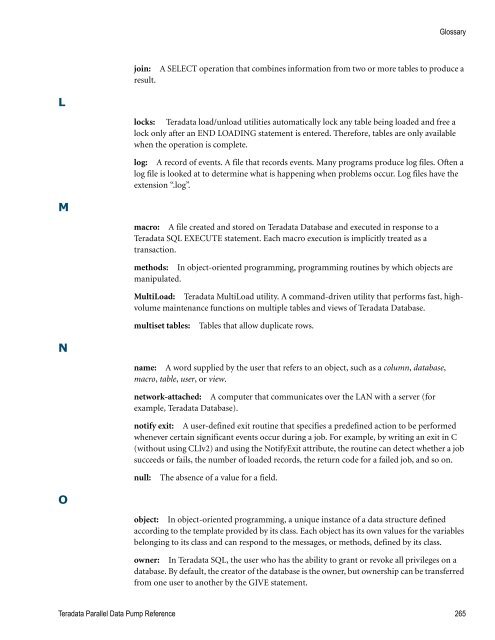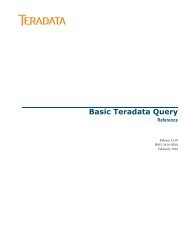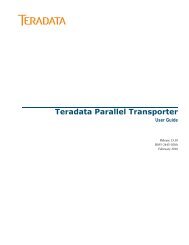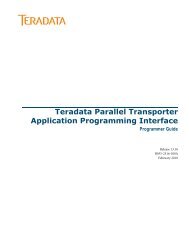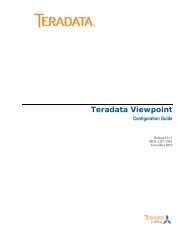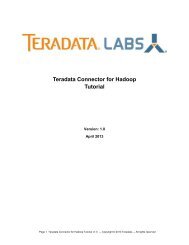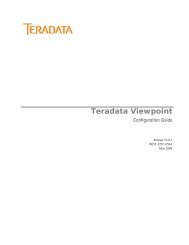- Page 1 and 2:
Teradata Parallel Data Pump Referen
- Page 3 and 4:
Preface Purpose This book provides
- Page 5 and 6:
Preface Additional Information Date
- Page 7 and 8:
Table of Contents Preface. . . . .
- Page 9 and 10:
Table of Contents Teradata TPump St
- Page 11 and 12:
Table of Contents Teradata TPump/No
- Page 13 and 14:
List of Tables Table 1: Teradata TP
- Page 15 and 16:
CHAPTER 1 Overview This chapter pro
- Page 17 and 18:
Chapter 1: Overview Teradata TPump
- Page 19 and 20:
Chapter 1: Overview Teradata TPump
- Page 21 and 22:
Chapter 1: Overview Teradata TPump
- Page 23 and 24:
Chapter 1: Overview Operating Featu
- Page 25 and 26:
Chapter 1: Overview Operating Featu
- Page 27 and 28:
Chapter 1: Overview Teradata TPump
- Page 29 and 30:
Chapter 1: Overview Teradata TPump
- Page 31 and 32:
Chapter 1: Overview Teradata TPump
- Page 33 and 34:
Chapter 1: Overview The Teradata TP
- Page 35 and 36:
Chapter 1: Overview The Teradata TP
- Page 37 and 38:
CHAPTER 2 Using Teradata TPump This
- Page 39 and 40:
Chapter 2: Using Teradata TPump Inv
- Page 41 and 42:
Chapter 2: Using Teradata TPump Inv
- Page 43 and 44:
Chapter 2: Using Teradata TPump Inv
- Page 45 and 46:
Chapter 2: Using Teradata TPump Inv
- Page 47 and 48:
Chapter 2: Using Teradata TPump Inv
- Page 49 and 50:
Chapter 2: Using Teradata TPump Inv
- Page 51 and 52:
Chapter 2: Using Teradata TPump Ter
- Page 53 and 54:
Chapter 2: Using Teradata TPump Res
- Page 55 and 56:
Chapter 2: Using Teradata TPump Res
- Page 57 and 58:
Chapter 2: Using Teradata TPump Pro
- Page 59 and 60:
Chapter 2: Using Teradata TPump Pro
- Page 61 and 62:
Chapter 2: Using Teradata TPump Pro
- Page 63 and 64:
Chapter 2: Using Teradata TPump Pro
- Page 65 and 66:
Chapter 2: Using Teradata TPump Pro
- Page 67 and 68:
Chapter 2: Using Teradata TPump Pro
- Page 69 and 70:
Chapter 2: Using Teradata TPump Wri
- Page 71 and 72:
Chapter 2: Using Teradata TPump Wri
- Page 73 and 74:
Chapter 2: Using Teradata TPump Wri
- Page 75 and 76:
Chapter 2: Using Teradata TPump Vie
- Page 77 and 78:
Chapter 2: Using Teradata TPump Vie
- Page 79 and 80:
Chapter 2: Using Teradata TPump Vie
- Page 81 and 82:
Chapter 2: Using Teradata TPump Mon
- Page 83 and 84:
Chapter 2: Using Teradata TPump Mon
- Page 85 and 86:
Chapter 2: Using Teradata TPump Est
- Page 87 and 88:
Chapter 2: Using Teradata TPump Est
- Page 89 and 90:
CHAPTER 3 Teradata TPump Commands T
- Page 91 and 92:
Chapter 3: Teradata TPump Commands
- Page 93 and 94:
Chapter 3: Teradata TPump Commands
- Page 95 and 96:
Chapter 3: Teradata TPump Commands
- Page 97 and 98:
Chapter 3: Teradata TPump Commands
- Page 99 and 100:
Chapter 3: Teradata TPump Commands
- Page 101 and 102:
Chapter 3: Teradata TPump Commands
- Page 103 and 104:
Chapter 3: Teradata TPump Commands
- Page 105 and 106:
Chapter 3: Teradata TPump Commands
- Page 107 and 108:
Chapter 3: Teradata TPump Commands
- Page 109 and 110:
Chapter 3: Teradata TPump Commands
- Page 111 and 112:
Chapter 3: Teradata TPump Commands
- Page 113 and 114:
Chapter 3: Teradata TPump Commands
- Page 115 and 116:
Chapter 3: Teradata TPump Commands
- Page 117 and 118:
Chapter 3: Teradata TPump Commands
- Page 119 and 120:
Chapter 3: Teradata TPump Commands
- Page 121 and 122:
Chapter 3: Teradata TPump Commands
- Page 123 and 124:
Chapter 3: Teradata TPump Commands
- Page 125 and 126:
Chapter 3: Teradata TPump Commands
- Page 127 and 128:
Chapter 3: Teradata TPump Commands
- Page 129 and 130:
Chapter 3: Teradata TPump Commands
- Page 131 and 132:
Chapter 3: Teradata TPump Commands
- Page 133 and 134:
Chapter 3: Teradata TPump Commands
- Page 135 and 136:
Chapter 3: Teradata TPump Commands
- Page 137 and 138:
Chapter 3: Teradata TPump Commands
- Page 139 and 140:
Chapter 3: Teradata TPump Commands
- Page 141 and 142:
Chapter 3: Teradata TPump Commands
- Page 143 and 144:
Chapter 3: Teradata TPump Commands
- Page 145 and 146:
Chapter 3: Teradata TPump Commands
- Page 147 and 148:
Chapter 3: Teradata TPump Commands
- Page 149 and 150:
Chapter 3: Teradata TPump Commands
- Page 151 and 152:
Chapter 3: Teradata TPump Commands
- Page 153 and 154:
Chapter 3: Teradata TPump Commands
- Page 155 and 156:
Chapter 3: Teradata TPump Commands
- Page 157 and 158:
Chapter 3: Teradata TPump Commands
- Page 159 and 160:
Chapter 3: Teradata TPump Commands
- Page 161 and 162:
Chapter 3: Teradata TPump Commands
- Page 163 and 164:
Chapter 3: Teradata TPump Commands
- Page 165 and 166:
Chapter 3: Teradata TPump Commands
- Page 167 and 168:
Chapter 3: Teradata TPump Commands
- Page 169 and 170:
Chapter 3: Teradata TPump Commands
- Page 171 and 172:
Chapter 3: Teradata TPump Commands
- Page 173 and 174:
Chapter 3: Teradata TPump Commands
- Page 175 and 176:
Chapter 3: Teradata TPump Commands
- Page 177 and 178:
Chapter 3: Teradata TPump Commands
- Page 179 and 180:
Chapter 3: Teradata TPump Commands
- Page 181 and 182:
Chapter 3: Teradata TPump Commands
- Page 183 and 184:
Chapter 3: Teradata TPump Commands
- Page 185 and 186:
Chapter 3: Teradata TPump Commands
- Page 187 and 188:
Chapter 3: Teradata TPump Commands
- Page 189 and 190:
Chapter 3: Teradata TPump Commands
- Page 191 and 192:
Chapter 3: Teradata TPump Commands
- Page 193 and 194:
Chapter 3: Teradata TPump Commands
- Page 195 and 196:
CHAPTER 4 Troubleshooting This chap
- Page 197 and 198:
Chapter 4: Troubleshooting Error Me
- Page 199 and 200:
Chapter 4: Troubleshooting Reading
- Page 201 and 202:
Chapter 4: Troubleshooting Reading
- Page 203 and 204:
CHAPTER 5 Using INMOD and Notify Ex
- Page 205 and 206:
Chapter 5: Using INMOD and Notify E
- Page 207 and 208:
Chapter 5: Using INMOD and Notify E
- Page 209 and 210:
Chapter 5: Using INMOD and Notify E
- Page 211 and 212:
Chapter 5: Using INMOD and Notify E
- Page 213 and 214: Chapter 5: Using INMOD and Notify E
- Page 215 and 216: Chapter 5: Using INMOD and Notify E
- Page 217 and 218: Chapter 5: Using INMOD and Notify E
- Page 219 and 220: Chapter 5: Using INMOD and Notify E
- Page 221 and 222: Chapter 5: Using INMOD and Notify E
- Page 223 and 224: Chapter 5: Using INMOD and Notify E
- Page 225 and 226: Chapter 5: Using INMOD and Notify E
- Page 227 and 228: Chapter 5: Using INMOD and Notify E
- Page 229 and 230: APPENDIX A How to Read Syntax Diagr
- Page 231 and 232: Appendix A: How to Read Syntax Diag
- Page 233 and 234: Appendix A: How to Read Syntax Diag
- Page 235 and 236: APPENDIX B Teradata TPump Examples
- Page 237 and 238: Appendix B: Teradata TPump Examples
- Page 239 and 240: Appendix B: Teradata TPump Examples
- Page 241 and 242: Appendix B: Teradata TPump Examples
- Page 243 and 244: Appendix B: Teradata TPump Examples
- Page 245 and 246: Appendix B: Teradata TPump Examples
- Page 247 and 248: APPENDIX C INMOD and Notify Exit Ro
- Page 249 and 250: Appendix C: INMOD and Notify Exit R
- Page 251 and 252: Appendix C: INMOD and Notify Exit R
- Page 253 and 254: Appendix C: INMOD and Notify Exit R
- Page 255 and 256: Appendix C: INMOD and Notify Exit R
- Page 257 and 258: APPENDIX D User-Defined-Types and U
- Page 259 and 260: Appendix D: User-Defined-Types and
- Page 261 and 262: Glossary A abend: Abnormal END of a
- Page 263: Glossary data loading: The process
- Page 267 and 268: Glossary script: or job. A file tha
- Page 269 and 270: Glossary z/OS (MVS (Multiple Virtua
- Page 271 and 272: Index Symbols - 46 &SYSAPLYCNT syst
- Page 273 and 274: Index function 30 syntax 186 usage
- Page 275 and 276: Index FastLoad 215 IBM interface 21
- Page 277 and 278: Index reduced print output runtime
- Page 279 and 280: Index THRU keyword IMPORT command 1


